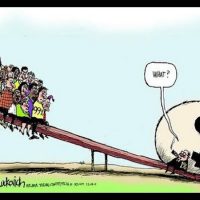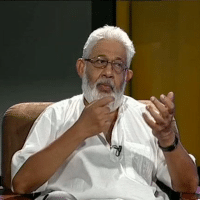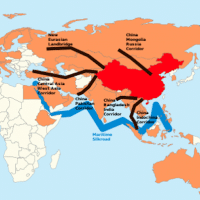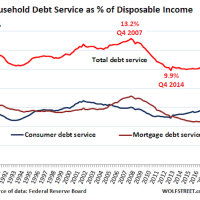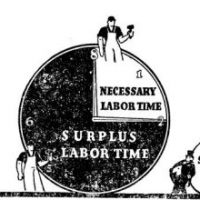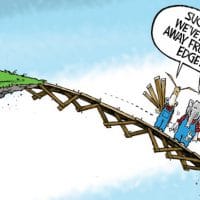-
The U.S. is a world leader in income and wealth inequality
A recent article published in the American Economic Review, “Global Inequality Dynamics: New Findings from WID.world,” draws upon the World Wealth and Income Database to examine trends in global inequality.
-
Has Donald Trump already changed U.S. trade?
Trump is threatening to dismantle the current world trading system, but in his first year US trading patterns show strong continuity with the previous administration.
-
Venezuela’s embarrassment of riches?
Letting the law of capitalist value govern society makes building socialism almost impossible because, even if the general guidelines of capitalist value seem to be acceptable, all it takes is for the market to plunge for you to lose your bearings entirely.
-
June 2018: reflections on 1988 three decades later
Capitalism as a system functions irrationally because social and ecological concerns cannot be taken into account when making business decisions. Profits before all else.
-
Watch Kshama Sawant call out councilmembers who voted to repeal the Amazon tax
Only days after passing a tax on Amazon and big business in Seattle, the corporate politicians in Seattle repeal the ordinance.
-
‘Corbynomics’ as fair and caring socialism
Karl Polanyi’s reciprocal, redistributive substantive-socialism; ‘Corbynomics’ as fair and caring socialism.
-
Confronting Cinema’s Fascist Unconscious with Maxximilian Seijo
In this episode, Money on the Left cohost Maxximilian Seijo (@maxseijo) expands upon the argument made in his video essay, “Inglorious Basterds: Nazi Desire Fully Employed,” which takes a neochartalist lens to Quentin Tarantino’s Inglorious Basterds (2008).
-
The global pivot away from America
There was a day when the world realised they’d had enough of America. It wasn’t when America turned it back on the Herculean effort to sign the world up to the Paris Climate Agreement or TTIP or America’s continuous support for Israel’s murderous actions in Gaza or various other deals that took years to iron out and negotiate that have since been trashed. It was a moment we knew was going to happen but least expected to prove so important.
-
White farms and black farms: will South African land finally shed apartheid’s proportions?
Many here say that South Africa’s constitution has never been an impediment to land redistribution; the problem was always the political will of the ANC, which abandoned Marxist ideology for a neoliberal approach.
-
Taming the gig economy
On May 21 Australian Greens deputy leader Adam Bandt introduced a small but potentially significant private member’s bill into the House of Representatives.
-
The Chinese economy: problems and prospects
The Chinese economy is big. In 2017, it was the world’s biggest based on purchasing power parity. Its output equaled $23.12 trillion, compared with $19.9 trillion for the EU and $19.3 trillion for the U.S.
-
Understanding Puerto Rico’s debt crisis through Marx, monsters and a queer decolonial lens
Colorlines talks to Philadelphia poet laureate Raquel Salas Rivera about their new book, “lo terciario/the tertiary,” which revisits Karl Marx’s “Capital” to examine Puerto Rico’s debt crisis from a queer decolonial lens.
-
The problem with “overpopulation”
The problem with “overpopulation”
-
Where the debt slaves are the most vulnerable
This type of chart is trotted out constantly these days to show that American households are in fabulous shape when it comes to their ability to service their blistering record debts.
-
Marx ratio
First there was the Great Gatsby curve. Then there was the Proust index. Now, thanks to Neil Irwin, we have the Marx ratio.
-
Living on the edge: Americans in a time of “prosperity”
These are supposed to be the good times—with our current economic expansion poised to set a record as the longest in U.S. history.
-
Sunday hits at racists
Organizers of the far-right AfD hoped to get 10,000 adherents for a march on Sunday in Berlin, but their ranks were far thinner, even with buddies from openly pro-fascist gangs. After distributing a thousand or more big German flags, they joined ranks and set off on their anti-foreigner, anti-Islam, anti-leftist Berlin crusade.
-
Job Guarantee as Historical Struggle with David Stein
In our inaugural episode, we consider the recent resurgence of full employment politics in the United States from both a political and historical perspective with historian David Stein (@davidpstein).
-
Steven Pinker’s ideas about progress are fatally flawed. These eight graphs show why
It’s time to reclaim the mantle of “Progress” for progressives. By falsely tethering the concept of progress to free market economics and centrist values, Steven Pinker has tried to appropriate a great idea for which he has no rightful claim.
-
Utopia and value theory
Mainstream economists refer to it as price theory, everyone else value theory. But whatever it’s called, it’s at the center of economists’ differing explanations of what happens in (and alongside) markets.

